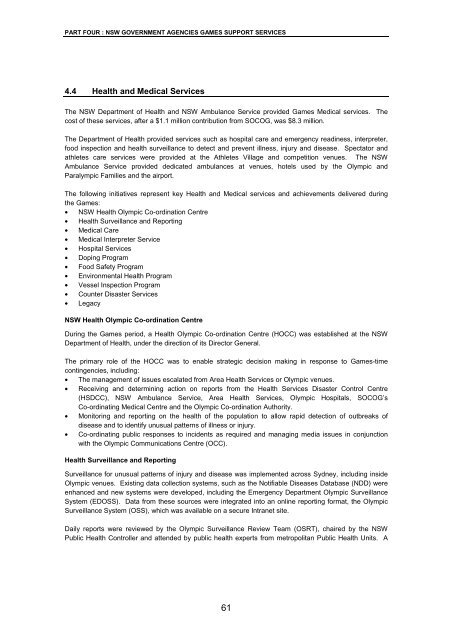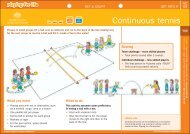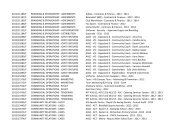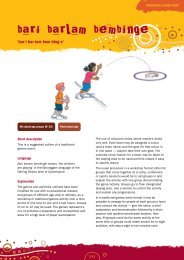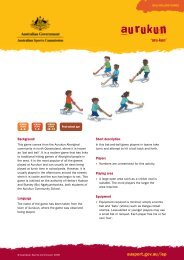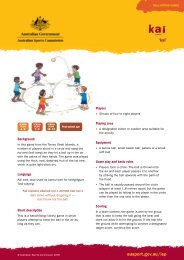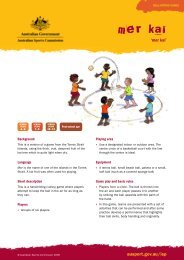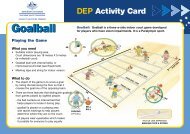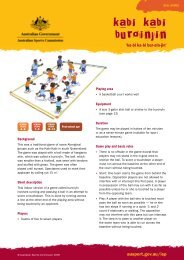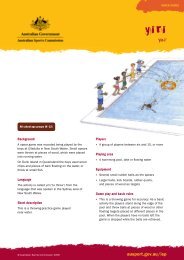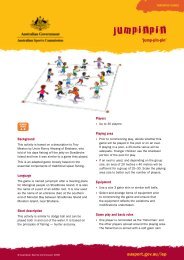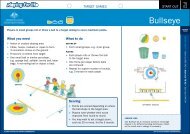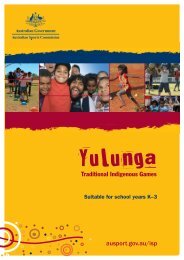the sydney 2000 olympic and paralympic games - Australian Sports ...
the sydney 2000 olympic and paralympic games - Australian Sports ...
the sydney 2000 olympic and paralympic games - Australian Sports ...
You also want an ePaper? Increase the reach of your titles
YUMPU automatically turns print PDFs into web optimized ePapers that Google loves.
PART FOUR : NSW GOVERNMENT AGENCIES GAMES SUPPORT SERVICES<br />
4.4 Health <strong>and</strong> Medical Services<br />
The NSW Department of Health <strong>and</strong> NSW Ambulance Service provided Games Medical services. The<br />
cost of <strong>the</strong>se services, after a $1.1 million contribution from SOCOG, was $8.3 million.<br />
The Department of Health provided services such as hospital care <strong>and</strong> emergency readiness, interpreter,<br />
food inspection <strong>and</strong> health surveillance to detect <strong>and</strong> prevent illness, injury <strong>and</strong> disease. Spectator <strong>and</strong><br />
athletes care services were provided at <strong>the</strong> Athletes Village <strong>and</strong> competition venues. The NSW<br />
Ambulance Service provided dedicated ambulances at venues, hotels used by <strong>the</strong> Olympic <strong>and</strong><br />
Paralympic Families <strong>and</strong> <strong>the</strong> airport.<br />
The following initiatives represent key Health <strong>and</strong> Medical services <strong>and</strong> achievements delivered during<br />
<strong>the</strong> Games:<br />
• NSW Health Olympic Co-ordination Centre<br />
• Health Surveillance <strong>and</strong> Reporting<br />
• Medical Care<br />
• Medical Interpreter Service<br />
• Hospital Services<br />
• Doping Program<br />
• Food Safety Program<br />
• Environmental Health Program<br />
• Vessel Inspection Program<br />
• Counter Disaster Services<br />
• Legacy<br />
NSW Health Olympic Co-ordination Centre<br />
During <strong>the</strong> Games period, a Health Olympic Co-ordination Centre (HOCC) was established at <strong>the</strong> NSW<br />
Department of Health, under <strong>the</strong> direction of its Director General.<br />
The primary role of <strong>the</strong> HOCC was to enable strategic decision making in response to Games-time<br />
contingencies, including:<br />
• The management of issues escalated from Area Health Services or Olympic venues.<br />
• Receiving <strong>and</strong> determining action on reports from <strong>the</strong> Health Services Disaster Control Centre<br />
(HSDCC), NSW Ambulance Service, Area Health Services, Olympic Hospitals, SOCOG’s<br />
Co-ordinating Medical Centre <strong>and</strong> <strong>the</strong> Olympic Co-ordination Authority.<br />
• Monitoring <strong>and</strong> reporting on <strong>the</strong> health of <strong>the</strong> population to allow rapid detection of outbreaks of<br />
disease <strong>and</strong> to identify unusual patterns of illness or injury.<br />
• Co-ordinating public responses to incidents as required <strong>and</strong> managing media issues in conjunction<br />
with <strong>the</strong> Olympic Communications Centre (OCC).<br />
Health Surveillance <strong>and</strong> Reporting<br />
Surveillance for unusual patterns of injury <strong>and</strong> disease was implemented across Sydney, including inside<br />
Olympic venues. Existing data collection systems, such as <strong>the</strong> Notifiable Diseases Database (NDD) were<br />
enhanced <strong>and</strong> new systems were developed, including <strong>the</strong> Emergency Department Olympic Surveillance<br />
System (EDOSS). Data from <strong>the</strong>se sources were integrated into an online reporting format, <strong>the</strong> Olympic<br />
Surveillance System (OSS), which was available on a secure Intranet site.<br />
Daily reports were reviewed by <strong>the</strong> Olympic Surveillance Review Team (OSRT), chaired by <strong>the</strong> NSW<br />
Public Health Controller <strong>and</strong> attended by public health experts from metropolitan Public Health Units. A<br />
61


